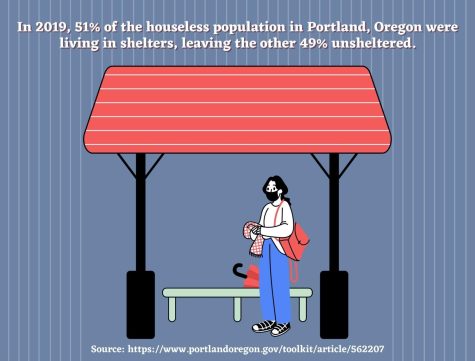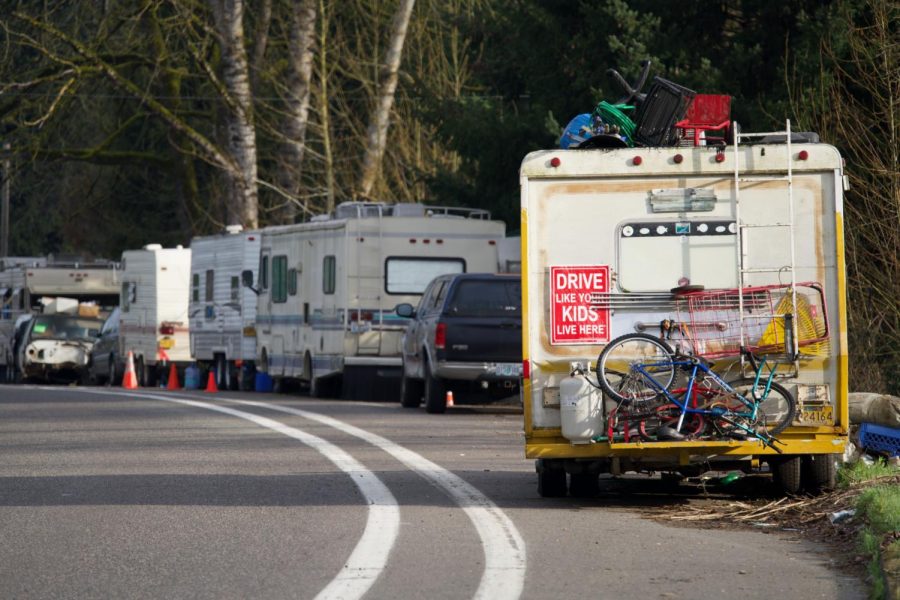The Pressing Houselessness Crisis in Portland
Trailers line the streets of Portland, designed as homes for the houseless.
March 16, 2022
Mobile homes are parked on streets until police forces remove them.
Roads are lined with tents.
People are holding signs in hope that someone might be generous enough to give them a dollar.
Despite the decades of attempts to address the houselessness crisis, it has only worsened. Most of Portland’s plans to end this monstrosity have failed for various reasons.
This is the reality of Portland: A hub for houselessness.
However, this reality is more complicated than what meets the eye. The city is led to believe that the houselessness population is taking over. In reality, Portland has fewer people experiencing houselessness than other large cities with a population of over 1 million. However, due to the lack of shelter available, the population becomes more visible.
As of 2019, Multnomah County found 4,015 people experiencing houselessness, reaching a record high with 2,037 of the houseless population living without shelter on the streets. 51% of the houseless population are living in shelters, leaving the other 49% unsheltered.
Being able to find a shelter with availability is hard enough. Portland lacks a tracking system that reveals what shelters have space or open beds. Unfortunately, even if one was to be accepted into a shelter, people suffering from drug abuse and mental health issues are often denied these resources.
San Francisco is a leading city with a high houseless population. However, the city has recently implemented a new tracking tool that has the potential to combat the issue. The new system, ONE (Online Navigation and Entry System) is intended to trace the housing, health, jail, and counseling of every houseless person within city limits. A few simple questions regarding their health history and future needs will put them in the database. It is expected that enough data will be collected for the city to begin housing placements for individuals.

In Portland, a houseless person is most likely to call a shelter individually due to that lack of resources that can be provided by an outreach worker, an individual whose work is designed to help and encourage disadvantaged members of the community. Resources such as Oregon Housing and Community Services and other local businesses have relied on 211, a hotline that provides locations and contact information to shelters. The pressing issue with this reliance is that operators do not maintain regular contact with shelters to determine availability, therefore it is not reliable at notifying individuals when there is actual availability.
If Portland implements a tracking system that is available to all, it would allow people without housing to find availability in shelters on their own. The city is using sources that are useful to the population. For example, the ESRI (The Environmental Systems Research Institute) is a resource that provides an online application that then tracks houselessness resources. The system shows a visual representation of the campsite locations.
Although this resource can be useful in some situations, it is flawed due to the fact that it excludes the large population of individuals who don’t have access to a mobile device to fill out the application. Additionally, it does not have the accuracy to track every shelter in the surrounding area.
This epidemic has put a strain on the city. Many voters are frustrated with the failed plans and broken promises. For years on end, Portland has continued to come up with new plans in order to address and solve the issue, but too many have been ineffective. This has resulted in a distrust between the people and our local government.
A survey articulated by People for Portland revealed that the city of Portland and Multnomah County have spent a total of $280 million over the past five years on the houseless population. The survey disclosed that the respondents answered with 75% of the potential solutions to solve the problem have been ineffective.
The overall consensus is that Portland has humans needlessly sleeping on the streets. The city continues to try and guarantee shelter but nothing is changing for those struggling to survive outside.
For those who don’t know when their next meal will be.
For those struggling with mental health issues and drug addiction.
Portland desperately needs to implement shelters and resources for the large population of unhoused individuals.






